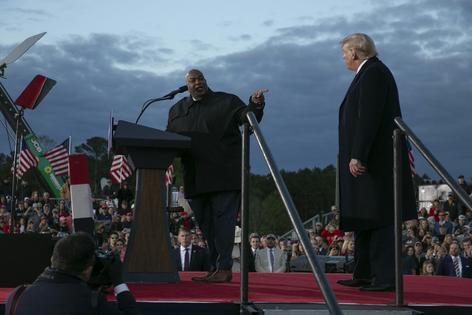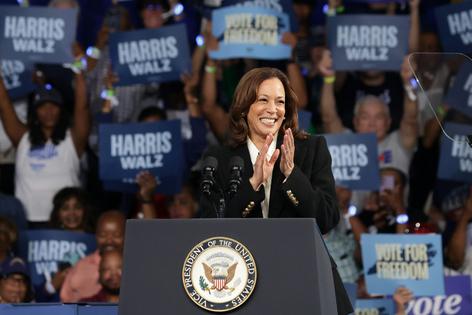North Carolina is not really a red or blue state − and that makes political predictions much more difficult
Published in Political News
For all its prominence as a key battleground state, North Carolina hasn’t done much swinging in U.S. presidential elections.
The last time a majority of North Carolinians voted for a Democratic candidate was 2008 for Barack Obama. The time before that was 1976 for Jimmy Carter. In the past 12 presidential elections, Republicans have won 10. Those Republicans include Donald Trump in 2016 and 2020.
But as I demonstrate in my 2024 book, “Anatomy of a Purple State: A North Carolina Politics Primer,” simply looking at the outcome of presidential voting gives a skewed understanding of voting behavior in other elections across the state.
Consider 2020 again. While it is true that Trump won North Carolina’s 15 electoral college votes – it now has 16, based on 2020 U.S Census Bureau data — his margin of victory was only about 74,000 votes out of some 5.4 million votes cast. It was the smallest margin of any state that Trump won.
Part of the reason is the nearly even split among voters in the two major parties and the emergence of registered voters who claim they are unaffiliated.
As of September 2024, North Carolina had 7.6 million registered voters. Of these, the largest group at 38% were registered as unaffiliated, followed by registered Democrats at 32% and registered Republicans at 30%.
Despite being considered a red state, North Carolina’s congressional delegation is split evenly between Democrats and Republicans with seven each. In addition, four of the state’s 10 statewide, elected Council of State officeholders, including Gov. Roy Cooper, are Democrats.
In no other Southern state does a single elected Democrat hold a similar statewide seat.
Though both of North Carolina’s U.S. senators are Republicans and the GOP holds supermajorities in both houses of the state Legislature, North Carolina is not entirely red or blue. It is undeniably purple – and that gives rise to further uncertainty over how the state will vote in the 2024 presidential election.
Before U.S. President Joe Biden dropped out of the race in July 2024, polls showed that he lagged behind Trump by 5 percentage points in North Carolina.
As in many other battleground states, it appeared that Trump had a small but fairly durable lead over Biden.
But soon after Vice President Kamala Harris became the Democratic nominee, several national polls showed Harris had an immediate bump and closed the gap – in some polls actually taking a lead. Trump has since regained a slight lead – less than a percentage point – in one October 2024 poll.
But Harris’ impact wasn’t just on national polls.
For the first time in years, Democratic Party registration began to exceed Republican Party registration in the state.
From July 20-26, 2,351 people registered as Democrats in North Carolina – a 44% increase compared with the previous week. During the same period, Republican and unaffiliated voter registrations were down 23% and 14%, respectively, from the previous week.
In spring 2024, during the height of primary season, Trump stepped into the North Carolina gubernatorial race by endorsing Lt. Gov. Mark Robinson, a Black Republican with a history of derogatory comments about Muslims and members of the LGBTQ community.
“This is a Martin Luther King on steroids,” Trump said of Robinson during a rally in Greensboro, North Carolina, on March 2, 2024.
Given Trump’s two wins in the state, his endorsement was expected to help Robinson beat Democrat Josh Stein in one of the nation’s most competitive state elections.
But Trump’s enthusiasm all but vanished after a series of negative stories about Robinson. They included a Sept. 19, 2024, CNN report alleging that Robinson frequented a porn web site called “Nude Africa” years ago where he described himself as a “Black Nazi.” Robinson also allegedly made a number of misogynistic and racist statements such as “slavery is not bad.”
Robinson denied the allegations and called the CNN report “salacious tabloid lies.”
Trump made another campaign stop in Wilmington on Sept. 21, 2024. Robinson, who had frequently appeared with Trump at previous North Carolina rallies, was not on the stage.
Polling conducted after CNN’s bombshell report showed an election that had shifted from competitive to one where the Democrat Stein is favored by a large margin to become North Carolina’s governor.
It is unclear whether Robinson’s apparent demise will affect the top of the ticket – or other state GOP candidates.
Hurricane Helene hit western North Carolina on Sept. 28 and brought high winds, flooding, an estimated US$47 billion in property damages and 250 deaths.
It also caused questions about access to voting in areas devastated by Helene and then, two weeks later, Hurricane Milton.
Twenty-nine counties in North Carolina were affected by the storm, although 13 counties received the brunt of the damage. Analysis of data from the North Carolina Board of Elections reveals that Trump led Biden by about a 10 percentage-point margin among voters in those affected counties.
Given this, lower turnout in this region might hurt Trump more than Harris. It’s little surprise then that the Trump campaign has called for expanding voting access in those areas.
But there’s no way to know who will receive North Carolina’s 16 Electoral College votes. Such is the unpredictable politics of a purple state.
This article is republished from The Conversation, a nonprofit, independent news organization bringing you facts and trustworthy analysis to help you make sense of our complex world. It was written by: Christopher A. Cooper, Western Carolina University
Read more:
A devastating hurricane doesn’t dramatically change how people vote – but in a close election, it can matter
The vote in Pennsylvania could decide the US election – it’s a battle for the suburbs
Swing-state GOP leaders amplified election denial in 2020 − and may do so again
Christopher A. Cooper does not work for, consult, own shares in or receive funding from any company or organization that would benefit from this article, and has disclosed no relevant affiliations beyond their academic appointment.


































































Comments